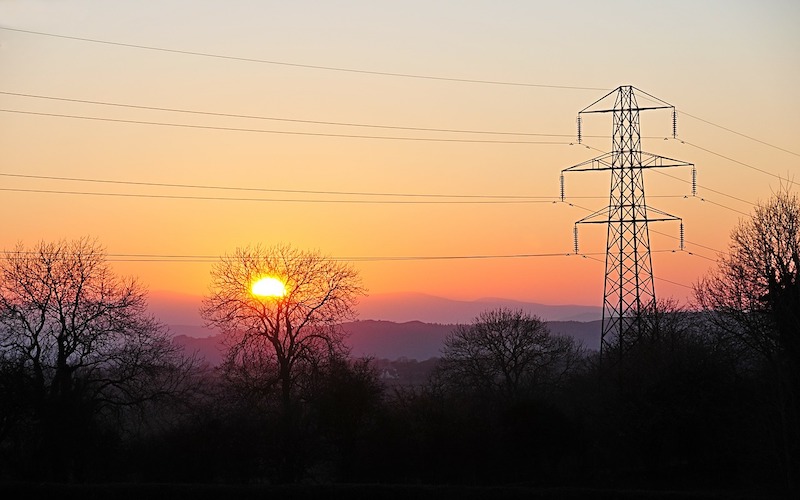
Massachusetts' new climate law could help make the utility grid more resilient to climate change. Photo: Shutterstock
For decades, Massachusetts families have worried through big storms about what would happen to their power. Would an electrical outage pull the plug on heat? Would it lead to the loss of food and medicines stored in the fridge?
Behind the anxiety was one unpleasant reality: For years, utility companies have avoided doing the hard work to ensure our electric system can withstand the increasingly extreme storms caused by climate change. Instead, they’ve waited for a storm to hit, then scrambled to repair the same old frail infrastructure in the same old places. And who gets the bill, storm after storm? The same customers who worry each storm about losing power. We’re the ones stuck with unreliable service. We’re the ones who pay the astronomical repair bills – plus interest – with no end in sight.
But Massachusetts residents can celebrate a victory that may end this costly, frustrating, and inequitable cycle. The Massachusetts legislature passed, and Governor Maura Healey has signed, a climate law that may be the first step toward a clean, reliable, and economical grid that will be less prone to outages and more resistant to extreme weather.
A Move Toward Reliability
The new law will streamline the process for developing clean energy infrastructure. That means utilities can make critical long-term upgrades to power lines, substations, and other distribution infrastructure without the years of permitting procedures that once were necessary. At the same time, communities hosting that infrastructure will get more say in any energy projects they propose. When utilities make these upgrades, they will invest in infrastructure built to last that will require fewer future repairs. And that protects consumers’ wallets.
The law does another good turn to household budgets by directing providers to offer discounted rates to low- and middle-income families while giving the state more flexibility to negotiate contracts with providers.
And even better, communities will not be left out of the permitting process. Developers will be required to ensure robust public involvement, a critical step as we build the infrastructure to handle more electric cars and buildings.
While setting the stage for critical electrical grid upgrades, the law also discourages gas companies from making expensive and unnecessary investments in new fossil fuel infrastructure. Instead, it allows gas companies to pursue promising clean energy strategies like geothermal projects. And before regulators approve gas utility expansion or replacement of gas pipelines, they must evaluate whether that would truly help toward the state’s carbon pollution limits.
A Way Out of the Cycle of Temporary and Costly Repairs
The possibilities inherent in this new bill contrast with what has been an expensive and frustrating reality in Massachusetts.
For decades, utility companies have failed to invest in preparing electrical infrastructure, such as power lines, poles, and substations, to withstand climate change’s extreme weather patterns. Despite warnings from other regions – most recently North Carolina, but also Texas in 2021 and New York after Hurricane Sandy in 2012 – the utilities have failed to learn lessons from the now foreseeable and routine weather disasters around us.
Sea level rise, the growing strength and frequency of winter storms and hurricanes, and predictions of longer and more heat waves in New England all threaten our electric grid. Yet these threats have not been adequately analyzed because utility companies know they can pass the cost of repairs on to us.
In 2023, Eversource asked for $338 million from customers to cover repairs from three storms in 2021 and 2022 – $86.4 million of which was interest charged to customers. National Grid has requested recovery of $67 million from one storm, the October 2021 nor’easter.
A Move Toward Equity
The Massachusetts climate law can be a step forward in changing this expensive and unsustainable pattern. Finally, we can break out of a bad habit, and utility companies can begin to do more long-term, comprehensive planning. This is important because their poor planning has, over the years, contributed to race and class inequity.
Utility companies haven’t prioritized the needs of low-income communities and communities of color, leading to these communities being more likely to experience power outages.
Research across the U.S. has also shown that utility companies have managed to build power lines that can withstand storms in more affluent neighborhoods but not in lower-income ones, leading to disparities in the incidence of blackouts. To add to the disparity, low-income communities also have less disposable income to pay the higher utility bills that inevitably result when utilities push repair costs onto consumers.
A First Step, But More is Needed
CLF and our supporters have pushed for years to improve our electrical grid and move to clean energy – and this climate bill is the culmination of that work. It can serve as a national model for how states can encourage utilities to do the necessary work to adapt and prepare for climate change. We’ll be watching closely to ensure the law is implemented in the best way possible so that Massachusetts residents can face the future with the confidence that they will not have to ride out the next big storm in the dark. Climate change isn’t waiting, and nor should we.



